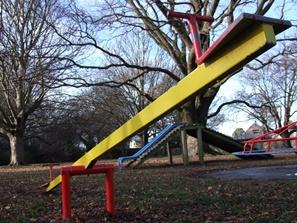We all know that search engines generate web page results for queries based on relevance and exact matches. The order by which they appear on the results pages depends on many factors. Just think that websites receive scores for each of those ranking factors. The one with the highest scores make it on top of the SERPs. They are basically the websites the search engines trust to contain relevant and valuable information.

Domain Authority may go up and down depending on how your site performs. Image credit: Flickr nzgabriel.
Speaking of trust, it is generally and instinctively given to websites that are considered authorities in their respective industries. It is because of that trust that people frequent those sites, reference them, and basically contribute to their ranking scores. In effect, the search engines recognize the users’ trust and the websites’ authority about certain topics, subjects, or industries.
What is Domain Authority?
Domain authority or DA—along with page authority or PA, which refers to the authority of a page as opposed to an entire domain—is a website rank metric devised by SEOMoz.com (now Moz.com). It is basically a measure of how well a website will do in the search rankings.
Domain authority is determined by these four factors:
1. Domain Age
– How old a website is
2. Domain Popularity
– The ratio of inbound links against outbound links
3. Domain Size
– Number of indexed pages
4. General Content
– The quality of the content found in the website
What these factors mean are basically:
• The older the website is, the higher the domain authority. All websites start out with a zero Page Rank score. As they accumulate content, backlinks, followers, regular visitors, and so forth, their credibility also builds in the eyes of the visitors and the search engines.
As time passes, the domain score of a website can easily climb from 10 to 30, for example. By experience though, it starts to get more difficult pulling the domain authority even higher than that. That can’t be accomplished by age alone.
• Similarly, the bigger the website, the higher its domain authority typically is. The large volume of pages increases the site’s opportunities for content optimization and earning valuable links.
• Speaking of accumulation of pages and content over time, the volume can only be valuable for domain authority if content quality is excellent in general.
• As a website ages and grows in size, it’s only natural for the number of indexed pages to also increase. Getting crawled immediately after new content goes live signifies that the search engine has been keeping an eye for new content from your site—most likely because it considers it trustworthy and a credible source of information for users.
The domain score typically applies to the rest of the pages in the site. This means that each time you publish new content, that page will start out at a very good footing in the search rankings. What’s more, newly published pages of websites with high domain authority scores usually get crawled and indexed quickly by search engines.
The domain authority of the domain is not permanent for each page though. If a page earns backlinks from authority sites, or let’s say the opposite happens and it gets poor-quality links instead, the page authority would either go up or down depending on the activities going on in the page.
Methods to Increase DA
Having identified the factors for the calculation of a website’s domain authority, we therefore come up with the following methods for further increasing one’s domain authority:
1. Audit your link profile. Considering that the Google Penguin has already been released, there’s an even greater need to check the quality of your existing inbound links. Request to remove links coming from lower-quality sites, pages with spammy content, completely unrelated websites, and bad neighborhood sites (ex: your website is all about costume jewelry making and selling, and you have links coming in from pornographic sites).
2. Diversify your link profile. This means you don’t concentrate on earning inbound links from just one authority site. Work to earn links from many different websites, as opposed to just having one source of inbound links.
3. Speaking of earning links, you can try the following:
a. Comment on posts on high-profile websites and include your URL. Those websites must implement do-follow for this to work though, and your comments must always be a genuine response to the post. Incorporate your URL in a smooth and natural way. Don’t copy and paste a generic reply because it will always show, may even be flagged by the site administrators as spam.
b. Sign up as guest blogger or writer in higher-ranking, authority sites. Be sure you can be permitted to include your URL alongside your name as part of the deal.
4. Don’t just direct links to your home page. Also include links leading to other pages within your website when you do blog commenting and guest posting.
5. Maintain high standards for your content. Thanks to Google Panda, poor content can pull down a page’s ranking and not even its domain authority can stop it. Besides, high-quality content can attract more readers and visitors, and reinforce your website’s image as an authority and a reliable sense of information.
6. Follow the rule book as your website ages. There’s nothing you can do about domain age, so you’d best divert your attention to earning high points for the other factors of domain authority.
7. Finally, you can visit the blogs and main websites of renowned domainers such as David Carter, Lawrence Ng, and Andrew Hazen.
These are tips for websites that have started from scratch. For those who are still planning to create a website, here is one tip that can guarantee you a good start where domain age is concerned: buy a domain that’s already been registered for quite some time. This gives you the advantage of old domain age right from the start. If the domain has been parked well, it may even have a decent domain authority already. This can cost you a pretty penny, but the returns can also eclipse the investment.
Check out domain sellers like GoDaddy, FastDomain, and Moniker for parked domains that you can use. You can also go straight to domain parking companies too, like Oversee.net, Skenzo, and DomainSponsor.
Choose a domain that doesn’t only suit your planned website but is also already quite old. It will be a huge bonus if you can also find one that’s already been optimized, marketed, and monetized by the domain parking company. You may even start earning an income through PPC if you choose to keep the domain parked while you prepare the content. The best part is, the domain may have already earned a high domain authority score by then.

